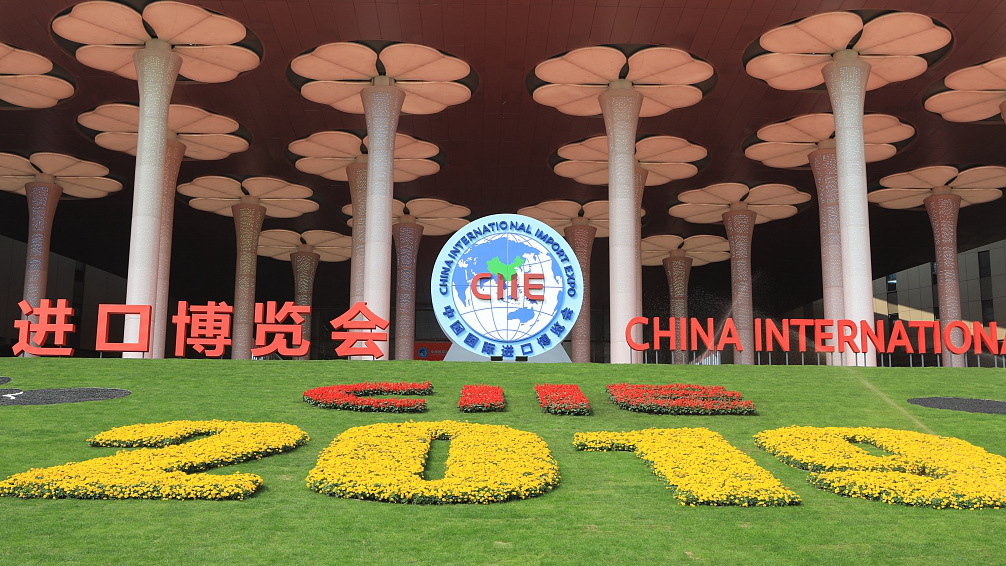
The International Exhibition Center in Shanghai, China, Nov 4, 2019. /VCG Photo
The International Exhibition Center in Shanghai, China, Nov 4, 2019. /VCG Photo
Editor's Note: Tom Fowdy is a British political and international relations analyst and a graduate of Durham and Oxford universities. He writes on topics pertaining to China, the DPRK, Britain, and the United States. The article reflects the author's opinions and not necessarily the views of CGTN.
At the opening ceremony of the second China International Import Expo in Shanghai on Tuesday morning, Chinese President Xi Jinping delivered a speech which called for economic globalization. Xi set out his vision under three principles: an "open and cooperative world economy," an "open and innovative world economy" and an "open and sharing world economy," illustrating that economic integration is the path of progress.
While committing China to greater openness and market access for foreign investors, Xi's speech would also see him express strong opposition to tariffs, economic protectionism, unilateralism and warn against the impact of a "knowledge blockade" and "technological divide," vowing at the same time to better protect intellectual property rights – a clear message against Washington's trade and technology wars.
Once again, China is placing itself as an open advocate of globalization in polarized contrast to the policies of the United States. This is not a power play or vision for hegemony, but should be understood within the context of China and the wider region's mutually shared needs. With prosperity in the modern era inseparably linked to economic interdependence and international integration, the only way forward is increased openness and cooperation. Xi is subsequently holding up this banner positively for China and in turn affirming that Beijing has an increasingly positive role to play in global markets, commerce and development.
Xi's economic philosophy is misunderstood and distorted by the West. What they claim to be a quest for hegemony and dominance is in fact a structural response to China's growing role in the global economy. As China has emerged as the world's second largest economy, its continuing development and prosperity has inevitably become interdependent with those around it. What affects China unavoidably affects the rest of the region, and subsequently China's growth is also limited to the performance of its neighbors.

The International Exhibition Center in Shanghai lights up to welcome the second China International Import Expo. /VCG Photo
The International Exhibition Center in Shanghai lights up to welcome the second China International Import Expo. /VCG Photo
As a result of this context, the need for economic cooperation inevitably transcends national boundaries and becomes an international question, a process which commenced in Europe long ago. This has subsequently led China upon a vision for regional and international integration with the view of addressing such challenges for future growth. This is the meaning of what Xi describes as a "community of shared future for mankind." Big projects stemming from this have been the Asian Investment and Infrastructure Bank (AIIB) and the Belt and Road Initiative (BRI).
The increasingly turbulent context of global trade has also seen Xi's vision evolve into commitments to greater market openness and a pledge to uphold global norms on free commerce. The trade war pursued by the United States is damaging the global economy and ushering in an era of protectionism. Owing to the effect of interdependence set out above, Trump's tariffs have had a domino effect which has hurt economies throughout Asia. It has spooked markets and damaged business confidence worldwide.
As a result of this, China is exerting global and regional leadership by pledging to uphold the necessities of globalized trade, business and integration against the forces of those who seek to disrupt it. Whether the United States likes it or not, countries of the world continue to depend on China as a source of growth and thus stable and open relations with Beijing remain a necessity.
Talk of things such as "decoupling" in the sphere of economics and technology paint a dismal prospect for the countries of the world, thus Xi is also calling upon nations to resist this mantra and support a global, interconnected economic system on the pragmatic grounds that it is the only feasible way forward. Division and disconnection will prove to be a disaster. The speech comes on the immediate result of dialogue for the Regional Comprehensive Economic Partnership formally concluding (albeit without India) with the deal, which might be signed in early 2020, a clear opt for a broad, regionally focused free trade order.
Therefore, as a whole, Xi Jinping's convention speech should be understood as China acknowledging and calibrating its increasing significance in the global economy and its growing interdependence with other countries. Economic prosperity in the modern era does not stop at national boundaries, but increasingly demands transnational forms of governance and thus openness to be successful. Xi is sending out the message that China is ready to meet this challenge, that it is prepared to further open its markets, expand free trade agreements with others and thus promote common development.
(If you want to contribute and have specific expertise, please contact us at opinions@cgtn.com.)